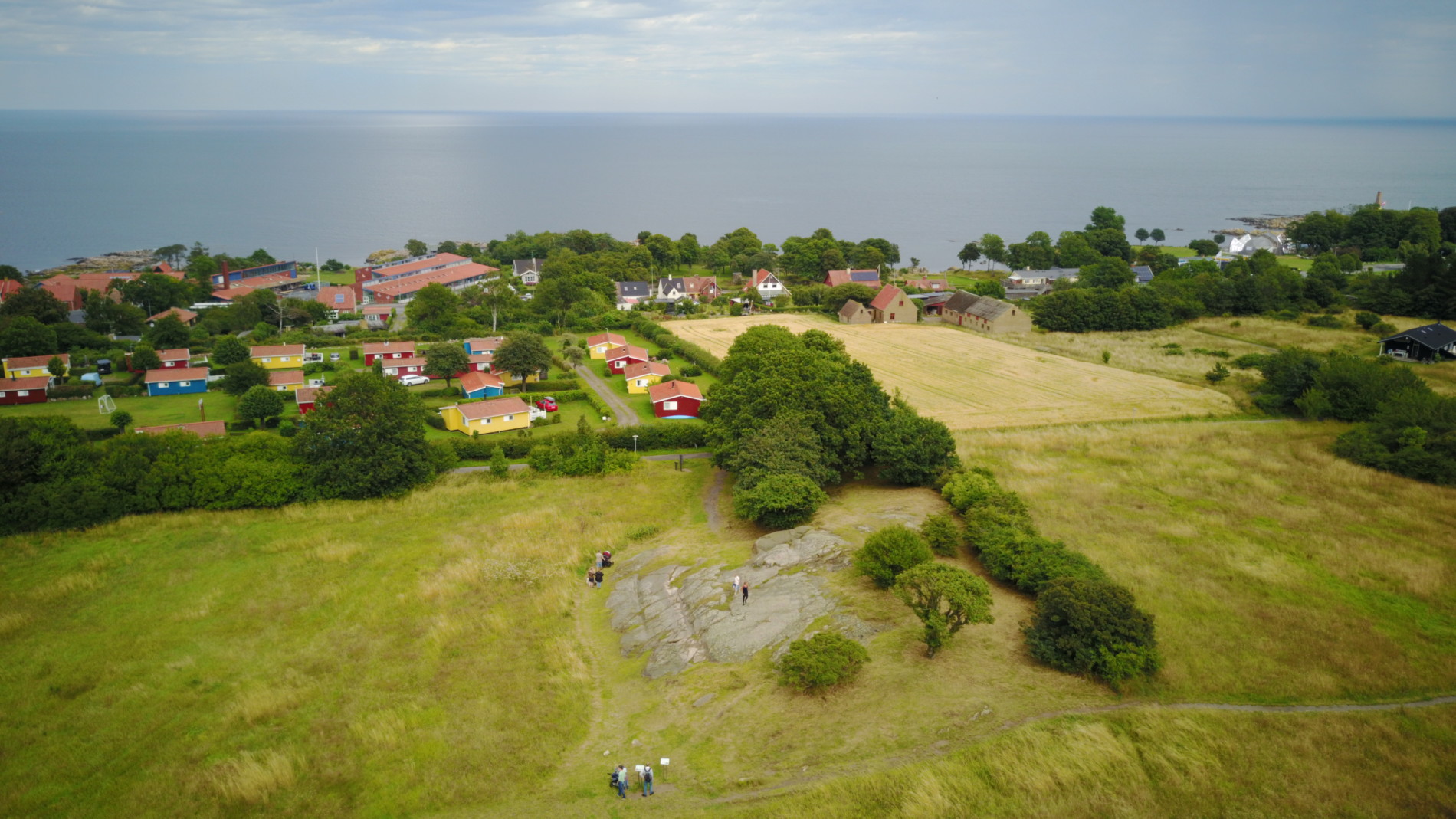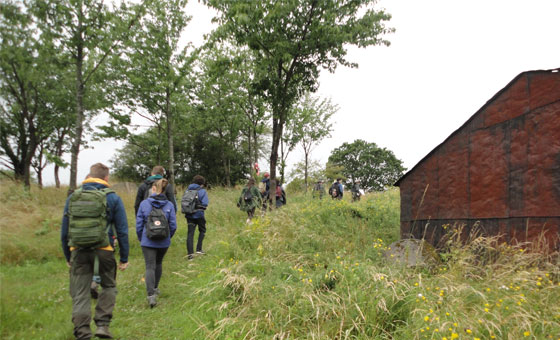Overview
The site of Vasagård is located on the southern side of the island of Bornholm, Denmark. Vasagård is separated by the 100m Læså valley from two nearly identical Neolithic sites, and consists of a tomb system where a dolmen and a passage grave can be found close to the settlement. The grave system and causewayed enclosures are dated from c. 3500 BC, and constitute the most north-eastern occurrence of this complex type in Europe. During the excavations of 2013-2017, almost three hundred broken and complete flat, engraved stones were uncovered, marked with patterns of radiating straight lines. Named “sun stones” or “solar stones”, archaeologists from the Bornholm Museum have postulated that these artifacts were likely part of the rituals carried out by Neolithic sun-worshipping practitioners about 5,000 years ago. New excavations will help to increase and to improve the amount of information about the site and the Neolithic Period in the Baltic region.
| Course Details | |
|---|---|
| Course Dates | June 2-June 29, 2024 |
| Course Type | Field Archaeology |
| Instructors | Dr. Finn Ole Nielsen, Dr. Jens Berthold, Dr. M. Nicolás Caretta & Michael Thorsen |
| Credits* | 8 semester (12 quarter) |
| Priority Deadline | February 1 |
| Fees Due By | Summer 1 (May 1) |
| Program Fees | |
|---|---|
| Tuition | $4,275 |
| Transcript Fee* | $300 |
| Health & Evacuation Insurance | $125 |
| Room (Meals not included) | $980 |
| TOTAL: | $5,680 |
Applications accepted on a rolling basis until program fills or final deadline above.
Instructors
The directors welcome emails and inquiries about the research elements of this project. More general information (tuition, health insurance, and payment schedule) can be found under the ‘Students’ tab above. Any further questions may be addressed to IFR staff. Additional details about research, course schedule, travel, accommodation, and safety can be found on the syllabus. Contacting the directors or the IFR office is encouraged and appreciated. It may help you determine if this field school is a good fit for you.
Testimonials
I had a fantastic time excavating at Vasagård last summer. It was highly informative, both in terms of how to excavate properly and Neolithic Denmark, and really fun. The instructors and staff were all exceptionally nice and attentive. They took us on tours throughout the island to look at different archaeological sites, such as the ship carvings and Sorte Muld. When they found out that one of us was interested in something, they worked to include it. When they found out that I had written my dissertation on bracteates, they brought one out from the Bornholm Museum’s collection and let us hold it, which was the highlight of my entire year! We got to learn about how unique the Vasagård site was and really see how the interpretation of some of the artefacts found was developing. It was an exceptional experience that really allowed me to put my theoretical knowledge of archaeology into practice and to develop as a person.
Payment & Student Fees
Application Fee: There is a $45 fee to submit an online application.
Deposit Payment: A nonrefundable $500 deposit is due within 3 weeks of program acceptance in order to secure your place. The remainder of your program fees are due by the deadline indicated under “Course Details”.
*Transcript Fee & Academic Credit Opt Out: If you wish to participate in an IFR field school without earning academic credits, you will not be charged a transcript fee.
For more information about payment, fees, and policies, see details under our Payment & Finances and Withdrawal and Cancellation Policy pages.
Accommodations
This program stays at a campsite in the city of Åkirkeby, approximately 15 km from the capital of the island of Bornholm. The site has comfortable cabins with beds (bathrooms with shower, WC, and heating system) in the guest house, which also provides free Wi-Fi. Participants are expected to bring sleeping bags and personal towels. Students will share a room based on gender and room size.
Meals are not included on this program due to the high cost to hire a cook or catering service. However, the house is properly furnished with all cooking appliances and refrigerators, so students can share the tasks of shopping and cooking their own meals at a lower price.
There are several options to buy food in the city for affordable prices. Food stores are within a walking distance from the guest house.
Staying at Aakirkeby Campsite
- Accommodation will be 2 students in 4-person cabins and 3 students in 5-person cabins.
- Cabins contain sleeping spaces but not toilets or bathrooms.
- It is the guests’ responsibility to keep the cabin clean during the stay and cleaning supplies will be provided by the project.
- Toilets / bathrooms are in a separate building and shared by residents of all cabins.
- Toilets, kitchen, and the common room are cleaned every day.


Travel Info
Natural disasters, political changes, weather conditions and various other factors may force the cancellation or alteration of a field school. IFR recommends students only purchase airline tickets that are fully refundable and consider travel insurance in case a program or travel plans must change for any reason.
General information for this program is below, but keep in mind we will discuss any updated travel information and regulations during the required program orientation, which could affect travel plans.
The island of Bornholm is located to the east of mainland Denmark. Students coming from the United States or other countries (except Sweden) should book airfare to Copenhagen, Denmark. From Copenhagen, travelers can take one of two routes to reach Bornholm (see below): 1) take a train from Copenhagen to Ystad, Sweden, and then catch a ferry from Ystad to the city of Rønne (on Bornholm); or 2) fly from Copenhagen to Bornholm Airport.
Students are expected to arrive by ferry at the port in Rønne or by plane at the Bornholm Airport on or before June 2, 2024. Students will be met at the airport or the ferry dock by the project directors or staff and taken to the guest house in Åkirkeby.
1. Traveling from Copenhagen to Bornholm via Ystad in Sweden
Take the Øresund train from Copenhagen to Sweden. At Malmö C, Hyllie or Triangeln you will need to switch to Skånetrafikens Pågatåg (commuter rail), which runs the rest of the road to Ystad, where the ferry is. A ticket is always required for the ferry. The trip by train and ferry and both trains can be booked together via DSB, link further down this page. Tickets are available from DKK 149,- one-way.
Total travel time from Copenhagen: Approx. 3 hours and 45 minutes.
2. Traveling from Copenhagen Airport to Bornholm Airport
There are frequent flights between Bornholm Airport and Copenhagen Airport (25 minutes flight). Be sure to check the low-cost flight options. (https://dat.dk)
VISA REQUIREMENTS
All students are required to have a valid passport when traveling to Denmark. US citizens should ensure that their passport is valid for 6 months after their planned trip before traveling to Denmark. Citizens of EU, EEA, USA, Canada, Japan, Republic of Korea, Australia, New Zealand and some countries in Latin America do not need a visa to Denmark for this field school. Citizens of other countries may need a visa, so we recommend consulting the nearest Danish embassy website for specific visa requirements. Where necessary, the BARC can send an official invitation letter that should be used at the relevant embassy to secure a visa to the program.
Student Safety
The IFR primary concern is with education. Traveling and conducting field research involve risk. Students interested in participating in IFR programs must weigh whether the potential risk is worth the value of education provided. While risk is inherent in everything we do, we do not take risk lightly. The IFR engages in intensive review of each field school location prior to approval. Once a program is accepted, the IFR reviews each program annually to make sure it complies with all our standards and policies, including student safety.
Students attending IFR international programs are covered by a comprehensive Health Insurance policy that includes physical illness or injury, mental or chronic conditions. No deductible and 100% of costs are covered up to $250,000. In addition, we provide Political and Natural Disaster Evacuation policy, which allow us to remove students from field school location if local conditions change. Our field school directors are scholars that know field school locations and cultures well and are plugged in into local communities and state institution structures.
Students attending IFR domestic programs (within the US) must have their own health insurance and provide proof upon enrollment. IFR field school directors are familiar with local authorities and if in need of evacuation, local emergency services and/or law enforcement will be notified and activated.
The IFR has strong, explicit and robust policy towards discrimination and harassment in the field. If students feel they cannot discuss personal safety issues with field school staff, the IFR operates an emergency hotline where students may contact IFR personnel directly.
Call us at 877-839-4374 or email us at info@ifrglobal.org if you have questions about the safety of any particular program.
















